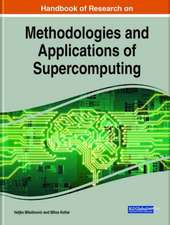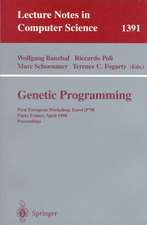Genetic Programming Theory and Practice XVIII: Genetic and Evolutionary Computation
Editat de Wolfgang Banzhaf, Leonardo Trujillo, Stephan Winkler, Bill Worzelen Limba Engleză Paperback – 14 feb 2023
| Toate formatele și edițiile | Preț | Express |
|---|---|---|
| Paperback (1) | 983.71 lei 6-8 săpt. | |
| Springer Nature Singapore – 14 feb 2023 | 983.71 lei 6-8 săpt. | |
| Hardback (1) | 989.96 lei 6-8 săpt. | |
| Springer Nature Singapore – 12 feb 2022 | 989.96 lei 6-8 săpt. |
Din seria Genetic and Evolutionary Computation
- 20%
 Preț: 934.69 lei
Preț: 934.69 lei - 20%
 Preț: 590.21 lei
Preț: 590.21 lei - 20%
 Preț: 997.25 lei
Preț: 997.25 lei - 20%
 Preț: 651.42 lei
Preț: 651.42 lei - 20%
 Preț: 614.43 lei
Preț: 614.43 lei - 20%
 Preț: 650.08 lei
Preț: 650.08 lei - 20%
 Preț: 332.24 lei
Preț: 332.24 lei - 20%
 Preț: 649.09 lei
Preț: 649.09 lei - 20%
 Preț: 995.09 lei
Preț: 995.09 lei - 20%
 Preț: 996.40 lei
Preț: 996.40 lei - 20%
 Preț: 643.17 lei
Preț: 643.17 lei - 20%
 Preț: 331.08 lei
Preț: 331.08 lei - 20%
 Preț: 340.32 lei
Preț: 340.32 lei - 20%
 Preț: 333.72 lei
Preț: 333.72 lei - 20%
 Preț: 651.23 lei
Preț: 651.23 lei - 20%
 Preț: 336.02 lei
Preț: 336.02 lei - 20%
 Preț: 1050.86 lei
Preț: 1050.86 lei - 20%
 Preț: 1458.70 lei
Preț: 1458.70 lei - 20%
 Preț: 992.44 lei
Preț: 992.44 lei - 20%
 Preț: 1048.53 lei
Preț: 1048.53 lei - 20%
 Preț: 1473.24 lei
Preț: 1473.24 lei - 20%
 Preț: 939.31 lei
Preț: 939.31 lei - 20%
 Preț: 593.54 lei
Preț: 593.54 lei
Preț: 983.71 lei
Preț vechi: 1229.64 lei
-20% Nou
Puncte Express: 1476
Preț estimativ în valută:
188.25€ • 204.42$ • 158.13£
188.25€ • 204.42$ • 158.13£
Carte tipărită la comandă
Livrare economică 23 aprilie-07 mai
Preluare comenzi: 021 569.72.76
Specificații
ISBN-13: 9789811681158
ISBN-10: 9811681155
Pagini: 212
Ilustrații: XIV, 212 p. 74 illus., 62 illus. in color.
Dimensiuni: 155 x 235 mm
Greutate: 0.33 kg
Ediția:1st ed. 2022
Editura: Springer Nature Singapore
Colecția Springer
Seria Genetic and Evolutionary Computation
Locul publicării:Singapore, Singapore
ISBN-10: 9811681155
Pagini: 212
Ilustrații: XIV, 212 p. 74 illus., 62 illus. in color.
Dimensiuni: 155 x 235 mm
Greutate: 0.33 kg
Ediția:1st ed. 2022
Editura: Springer Nature Singapore
Colecția Springer
Seria Genetic and Evolutionary Computation
Locul publicării:Singapore, Singapore
Cuprins
Chapter 1. Finding Simple Solutions to Multi-Task Visual Reinforcement Learning Problems with Tangled Program Graphs.- Chapter 2. Grammar-based Vectorial Genetic Programming for Symbolic Regression.- Chapter 3. Grammatical Evolution Mapping for Semantically-Constrained Genetic Programming.- Chapter 4. What can phylogenetic metrics tell us about useful diversity in evolutionary algorithms?.- Chapter 5. An Exploration of Exploration: Measuring the ability of lexicase
selection to find obscure pathways to optimality.- Chapter 6. Feature Discovery with Deep Learning Algebra Networks.- Chapter 7. Back To The Future — Revisiting OrdinalGP & Trustable Models After a Decade.- Chapter 8. Fitness First.- Chapter 9. Designing Multiple ANNs with Evolutionary Development: Activity Dependence.- Chapter 10. Evolving and Analyzing modularity with GLEAM (Genetic Learning by Extraction and Absorption of Modules).- Chapter 11. Evolution of the Semiconductor Industry, and the Start of X Law.
Notă biografică
Wolfgang Banzhaf is a professor in the Department of Computer Science and Engineering at Michigan State University.
Textul de pe ultima copertă
This book, written by the foremost international researchers and practitioners of genetic programming (GP), explores the synergy between theoretical and empirical results on real-world problems, producing a comprehensive view of the state of the art in GP. In this year’s edition, the topics covered include many of the most important issues and research questions in the field, such as opportune application domains for GP-based methods, game playing and co-evolutionary search, symbolic regression and efficient learning strategies, encodings and representations for GP, schema theorems, and new selection mechanisms. The book includes several chapters on best practices and lessons learned from hands-on experience. Readers will discover large-scale, real-world applications of GP to a variety of problem domains via in-depth presentations of the latest and most significant results.
Caracteristici
Provides papers describing cutting-edge work on the theory and applications of genetic programming (GP) Offers large-scale, real-world applications (big data) of GP to a variety of problem domains Presents theoretical exploration of exploration, lexicase, and other selection



















